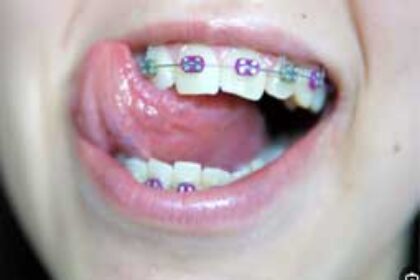Should Speech Therapy be Stopped During Orthodontics?

Hi, I have a question about a 7 years 7 months child who is about to be fitted with headgear, palate expanders, etc., due to a crossbite and underbite. The parents are being told by the orthodontist that he should not receive speech therapy during this time. I’m embarking on a research quest to see what I can find that would support, or negate, that recommendation, so I can advise the parents appropriately. He is being seen by me for a frontal lisp and deviant /r/ productions; all other initial phonemes previously in error have been corrected. Would you share with me your professional opinion, or factors you would suggest to guide us in making an appropriate decision? Are there any professional resources you would also recommend I read? While I recognize the impact of the dental alignment issues with his frontal lisp, I see lingual issues unrelated solely to the dental malalignment, particularly affecting the /r/ productions.
Thank you so much!
BC
There are a lot of missing pieces that make it difficult to determine what to do, when to do it, etc. I’ll write some questions and comments below:
1. When you examined his palate, was he adequately able to suction and fit the tongue within the palate? If not, how excessive was the overflow?
If his dental and/or palatal vault are narrow and/or the palate is significantly narrow, you should probably give up on R habituation until those issues are resolved orthodontically.
2. Some orthodontists are familiar with orofacial myology and might be correct in their determination to wait; others that I have seen are unaware of what we do and have made poor recommendations to families. I don’t recall if you took our Northern Speech online course on R, but it will be of great help if you have not yet taken it.
3. As for the frontal lisp, our course by Motivations, Inc. is very useful as well. It helps you rule out possible barriers to success such as ankyloglossia, certain orthodontic devices, airway issues, and oral habits. For example, if he has enlarged tonsils, allergies, or other airway issues, it might be a “compensatory” lisp and absolutely necessary until such time that the airway or other barrier is eliminated.
4. You mentioned that all other initial errors have been corrected. What sound errors were there?
Were they related to placement of the tongue to incisive papilla, such as t,d,n,l?
Were they related to possible lip weaknesses such as bilabials?
Were they related to weak suctioning skills such as SH, J, ZH, CH?
Were they related to an open bite or overjet or class III occlusion, for example?
Sound errors can be linked most of the time to a structural issue or barrier. Unless that is addressed first, the chance of true habituation is minimized, sometimes only being achieved it the client speaks ‘slowly’, for example…and that is not true habitation in that case.
We teach in our training course that sometimes there is a time to stop at a certain point, apply ortho or other intervention, and then reinstate what we had started to do. When there are barriers, they must be addressed first. We teach our dental grads that they, also, have certain considerations whereby they can only go so far before calling upon an SLP to work in tandem with a client.
I hope some of the above has stimulated you a bit to delve deeper and hopefully come up with the best decision for this young man. Let me know if any of it helped.
